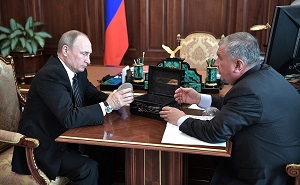Please activate JavaScript in your browser to use all interface options.
- About rosneft
- Corporate governance
-
Business
Upstream
- General Information
- Licensing
- Geological Exploration
- Reserves and resources
- Production and Development
- Gas Business
- Offshore projects
- Offshore equipment
Downstream
- General information
- Petroleum refining
- Gas Processing
- Petrochemistry
- Catalyst plants
- Production of lubricants
- Sales of oil products
- Sales of Petrochemical products and LPG
- Gas Sales
- Gas Motor Fuel Sales
-
For Investors and Shareholders
- Corporate documents
- Financial statements, presentations, annual reports
- LSE RNS disclosure
- Investor calendar
- Rosneft: Contributing to Implementation of UN Sustainable Development Goals
- ESG
- Equity
- For Insiders
- Shareholder’s Personal Account
- General shareholders' meeting
- Dividends
- Questions and answers for shareholders
- Investor tools
- Contacts
- Beware of fraud!
- Sustainable Development
- News room
Vladimir Putin received Igor Sechin in Kremlin
20 June 2017 |
| Photo Credit: Press Service of the President of Russia |
Vladimir Putin received Chief Executive Officer of Rosneft Igor Sechin in the Kremlin. The Company's development, results of its privatization, as well as changes in dividend policy were discussed at the meeting. President instructed the Company to consider the issue of paying Rosneft's shareholders 50% of dividends based on net revenue. Also Vladimir Putin asked Company to discuss the development of high technologies, the latest production techniques and changes on the international market at the forthcoming general shareholders’ meeting.
President instructed the head of Rosneft to develop a new growth policy to have an opportunity to face the modern challenges including international markets volatility and advanced technologies development.
Igor Sechin noted that Rosneft intends to use all solutions aimed at boosting efficiency, cutting-edge technology in oil production and processing to approach the premium customer markets such as petrochemistry.
During the meeting Igor Sechin also reported Vladimir Putin about a new offshore oilfield discovery in Khatanga Bay of the Laptev Sea.
 |
| Photo Credit: Press Service of the President of Russia |
«Thanks to your good graces, when you gave the command, Rosneft started working at the Khatanga licensed site, and we already received the first results of this work» – Sechin said.
Rosneft CEO introduced a sample of core brought from a depth of 2 kilometers to Vladimir Putin: «This is a unique core for our deposits by its high hydrocarbon content and productive bed thickness» – noted Sechin.
Based on the results of the tentative analysis the Company CEO expressed his confidence in discovering «a very rich deposit». Rosneft intends to continue the exploratory drilling in order to study the Eastern Arctic shelf.
«Today our geologists are saying these will be unique deposits,» noted Sechin while stressing that, according to preliminary technical studies in the Laptev Sea area, they may contain up to 9.5 billion tonnes of oil equivalent.
Rosneft
Information
Division
June 20, 2017

-315xx70.png)

